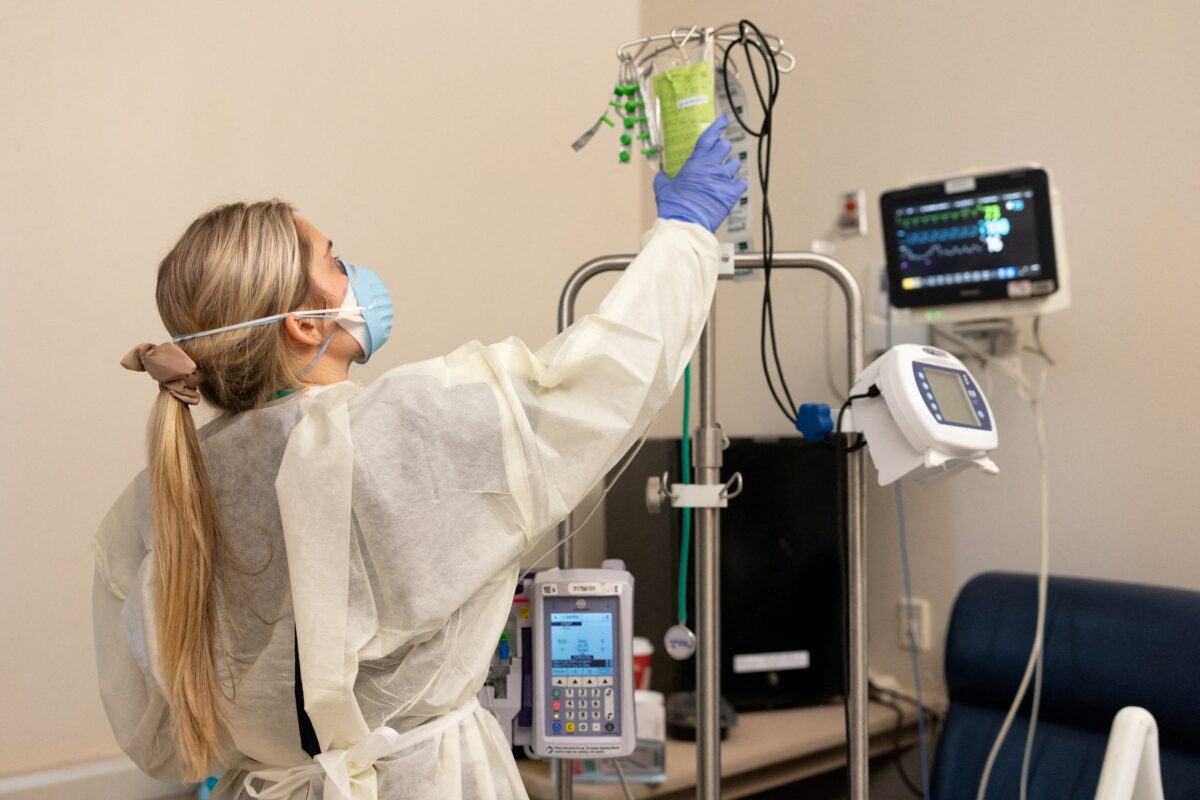The Biden administration has purchased 600,000 treatments courses of a new COVID-19 monoclonal antibody drug that data shows works against the omicron variant of the CCP (Chinese Communist Party) virus.
Known as bebtelovimab, the drug is manufactured by Eli Lilly and Company, an American pharmaceutical company headquartered in Indianapolis, Indiana.
It is used in the treatment of mild to moderate COVID-19 in certain high-risk patients and works via laboratory-made proteins that mimic natural antibodies the body produces to fight off harmful pathogens.
The drug has not yet received emergency use authorization (EUA) from the U.S. Food and Drug Administration (FDA) but if it does, the Department of Health and Human Services (HHS) said it will make the treatment available to states free of charge.
In a statement, HHS Secretary Xavier Becerra said the purchase of the 600,000 treatments courses of bebtelovimab was “part of the Biden-Harris administration’s commitment to ensuring Americans who get sick with COVID-19 have access to treatments that work.”
“Under President Biden’s leadership, we are prepared for the challenges we face with COVID-19 and are laser-focused on saving lives,” said Becerra. “If authorized by FDA, this purchase will add an additional 600,000 courses of treatment to our nation’s ‘medicine cabinet’ that could help prevent severe outcomes for Americans who do get sick with COVID-19.”
Becerra also stressed that the administration’s top priority was to prevent people from getting sick with COVID-19 and urged everyone to get vaccinated or boosted if they can.
Under the contract, HHS said it would receive approximately 300,000 treatment courses of the monoclonal antibody in February and about another 300,000 treatment courses in March.
If and when the treatment is authorized, HHS said it would make the treatment available immediately. The contract also includes a future option for 500,000 more doses.
Officials said early data suggested that the newest product by Lily has “activity against both Omicron and the BA.2 Omicron subvariant” the latter of which is believed to be a more transmissible subvariant of Omicron.

The World Health Organization on Feb. 9 said that the BA.2 Omicron subvariant will increase around the world but said there is currently no indication as to whether or not the subvariant might cause a more severe illness than the original.
Should the number of BA.2 subvariant cases rise in the U.S., the new drug could help to ensure the administration can continue to offer Americans a monoclonal antibody treatment that “works against that strain of the virus,” officials said.
Eli Lilly, in a separate statement, said the U.S. government agreed to pay at least $720 million for the treatment courses under the agreement.
The company said it has submitted a request for an EUA for bebtelovimab and that “Pseudovirus and authentic virus testing demonstrate that bebtelovimab retains full neutralizing activity against Omicron.”
“In addition, pseudovirus testing with bebtelovimab demonstrates that it retains neutralization against all other known variants of interest and concern, including BA.2,” Eli Lilly and Company said.
The announcement comes after the FDA in January said it was restricting the use of two monoclonal antibody treatments for COVID-19, made by Eli Lilly and Regeneron, because data showed they are “highly unlikely” to be active against the Omicron variant.
The Omicron variant of COVID-19 is currently the dominant strain in the United States, and officials say it makes up roughly 99 percent of all cases in the country.
HHS said it has so far this year provided more than 2.5 million COVID-19 treatments and therapies, including antiviral pills and monoclonal antibodies, to states so that Americans who contract COVID-19 can use them.
“We have more COVID-19 treatments than ever before, we are providing a billion free at-home tests, and we have enough vaccines to get everyone vaccinated and boosted,” Becerra said.
